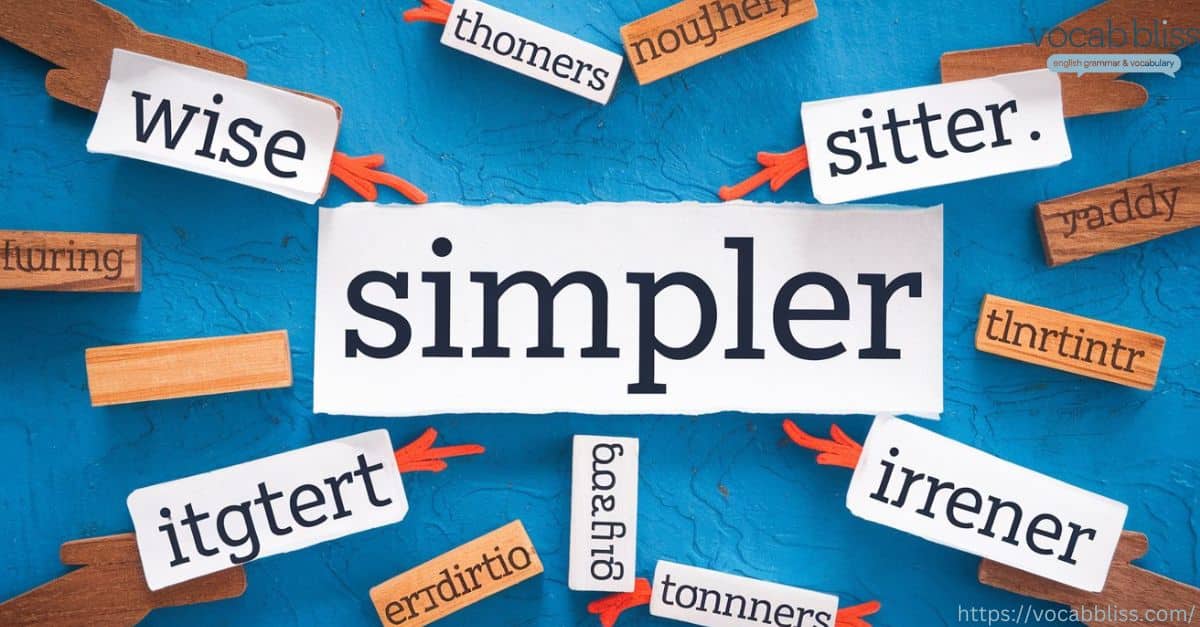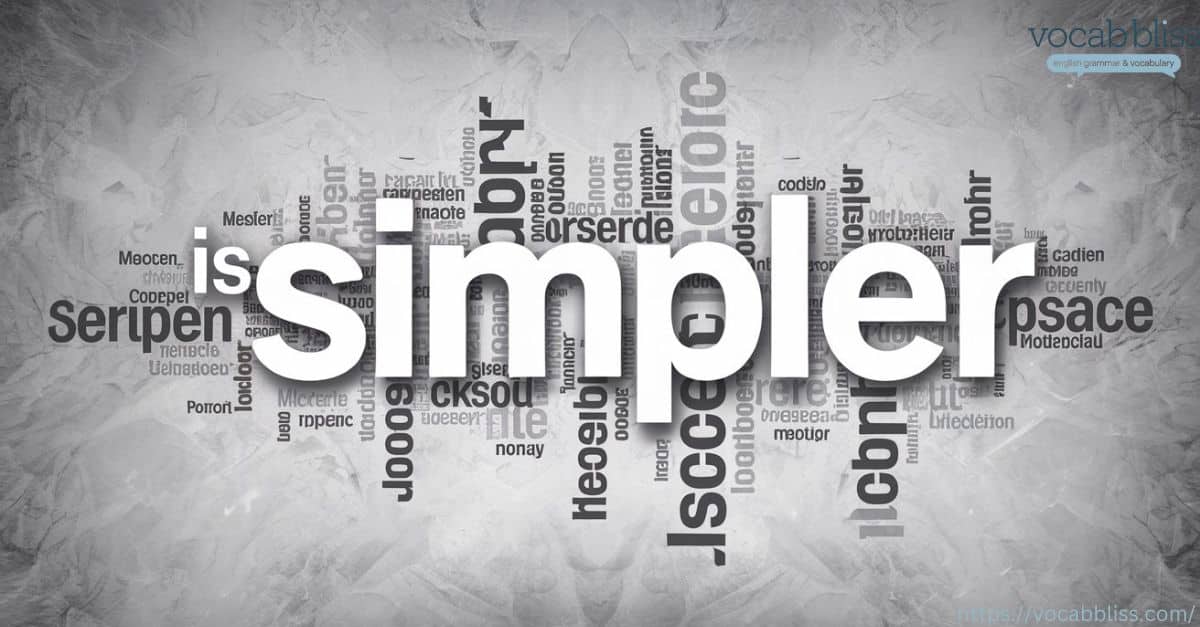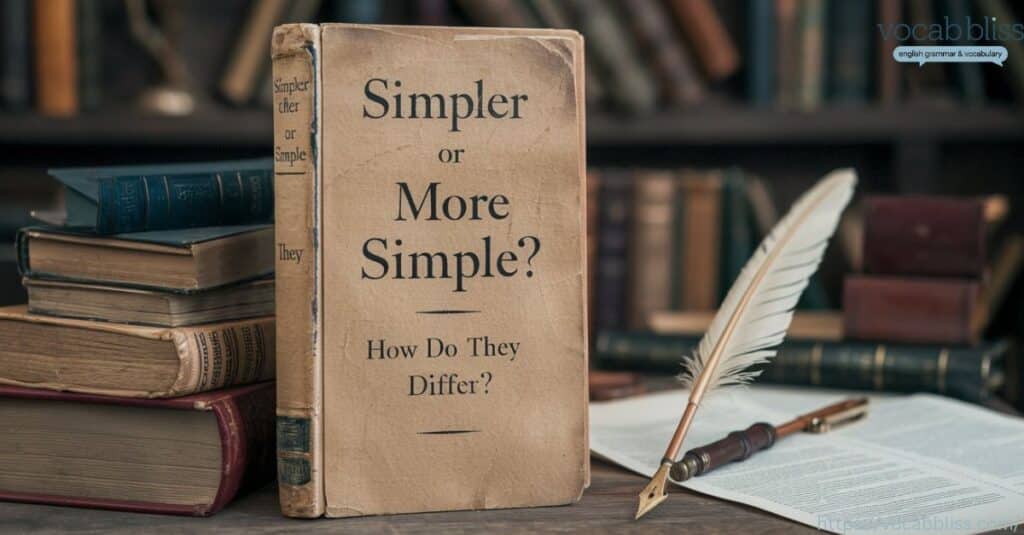The article clarifies the difference between “simpler or more simple” It explains that “simpler” is the comparative form of “simple,” used when comparing two things, while “more simple” emphasizes the concept of simplicity but is less common and can sound awkward.
For everyday use, “simpler” is generally preferred for smoother flow and readability, whereas “more simple” may be used for emphasis in specific contexts. The article provides examples and practical advice for choosing between the two, highlighting that both forms are grammatically correct. Ultimately, the choice depends on context and personal style, with a focus on clear communication.
Understanding “more simple or simpler”
To start, it’s helpful to understand what more simple or simpler mean and how they fit into the English language. Both phrases represent the comparative form of “simple,” but each has unique applications, nuances, and implications for style and tone.
What Does “Simpler” Mean?
In English, “simpler” is the standard comparative form of the adjective “simple.” Just as “tall” becomes “taller” and “fast” becomes “faster,” “simple” becomes “simpler” when comparing two or more things.
Using “simpler” tends to sound concise and straightforward. It’s the go-to option in most cases, especially in informal or conversational language. Here’s an example:
- Example: “The instructions in this manual are simpler than those in the previous edition.”
In this case, “simpler” is the obvious choice, especially since it helps keep sentence flow readability smooth and natural.
When Does “Much Simpler” Make Sense?
Though “simpler” is generally more common, “much simpler” also has its place in English. Adding “Much simpler” is a phrase we use to emphasize clarity, especially when comparing options.
This expression highlights just how straightforward one option is over another, making it useful for everyday language and informal writing. It’s perfect for situations where ease and readability matter. For example, instead of saying,
“The new app is simpler than the old one,” saying, “The new app is much simpler” conveys a stronger, clearer message. Use “much simpler” when you want to emphasize a major improvement in simplicity without adding extra complexity to your writing.
Is Simpler a Word?
To address a common question—yes, simpler is a word! It’s an accepted form in the English language and is widely used as the comparative form of “simple.” So, if you’re ever unsure, rest assured that “simpler” is a grammatically correct and well-accepted choice.

Grammar Rules: simpler vs more simple
Now that we know both forms are correct, when should you use each? Let’s look at grammar rules and stylistic preferences to determine the most appropriate choice.
Use “Simpler” When:
- Informal or everyday language use: In casual writing and speech, “simpler” flows naturally and is commonly used.
- Grammatical conciseness is preferred: For straightforward, conversational sentences, “simpler” often sounds more natural.
- Avoiding redundancy: In quick instructions or short descriptions, “simpler” is often the most direct and readable choice. Example: “The process is simpler than it used to be.”
Use “More Simple” When:
- Emphasis is required: In formal or technical documents, “more simple” can provide greater emphasis, particularly if clarity is the goal.
- To slow down sentence flow: In formal writing or technical instructions, adding “more” allows for a slight pause, which can help readers absorb information.
- When writing to an audience that benefits from additional clarity: Non-native English speakers or audiences unfamiliar with comparative forms may appreciate the directness of “more simple.” Example: “For those new to coding, the more simple language is recommended.”
Tip: As a rule of thumb, “simpler” should be your default choice in most situations, especially when writing informally. For clarity, reserve “more simple” for special cases, such as emphasis or stylistic preference context.
Key Grammar Rules and Examples
To help clarify further, here’s a quick overview of comparative forms for adjectives:
| Type of Adjective | Comparative Form | Example |
|---|---|---|
| One-syllable | Add “-er” | Simple → Simpler |
| Multi-syllable | Use “more” before adjective | Beautiful → More beautiful |
Since “simple” is a one-syllable word, English grammar rules generally call for the “-er” ending, making “simpler” the natural comparative form. However, because “simple” can be used with “more” for emphasis, both forms are grammatically correct.
This duality is what makes comparative form simple a point of confusion for many learners and even native speakers.
Side-by-Side Comparison: Simpler vs. More Simple in Context
Let’s look at a comparison of “simpler” vs. “more simple” in different sentences. This side-by-side format will highlight how context can dictate the best choice for each situation.
| Context | Example Using “Simpler” | Example Using “More Simple” |
|---|---|---|
| Casual Conversation | “This guide is simpler than the last.” | “This guide is more simple and easy to follow.” |
| Formal Writing | “A simpler approach was developed.” | “A more simple approach was required to ensure clarity.” |
| Technical Documentation | “Simpler code reduces errors.” | “The more simple the code, the easier it is to debug.” |
Observation: In technical and formal contexts, “more simple” often adds clarity, while “simpler” feels smoother and more natural in conversational or everyday language use.
Everyday Language Use and Tone
Tone and setting often dictate the choice between simpler and more simple. Everyday language, for example, tends to favor shorter, more fluid words, which makes “simpler” the better choice in most casual or conversational cases.
- Conversational Tone: In informal language, where sentences are shorter and less complex, “simpler” fits well and feels more natural.
- Formal Writing Context: In formal or academic writing, using “more simple” can offer a sense of emphasis or precision. This can be especially useful in professional writing tips and business communication, where clarity is crucial.

Real-Life Examples and Usage Tips
Understanding which form to use in different scenarios can enhance your effective communication skills. Here are some specific tips and examples to help guide your choice:
Writing Tips for Different Contexts
- In How-To Guides and User Manuals: Use “simpler” for brevity and readability.
- Example: “To make the system simpler, follow these instructions.”
- Formal Writing and Academic Papers: Use “more simple” sparingly, but consider it for technical explanations or when added emphasis is required.
- Example: “A more simple explanation could help new students grasp the concept.”
- Everyday Communication: Opt for “simpler” in conversations, emails, or casual settings. It’s more familiar and less likely to cause confusion.
- Example: “Choosing the simpler route saved us time.”

Quick Tips for Choosing the Right Form
- Match your audience: If you’re writing formally or for a technical purpose, “more simple” may sound better. In everyday conversation, “simpler” usually works best.
- Consider text rhythm and readability: “Simpler” typically provides a better text rhythm in short, flowing sentences.
- Reserve “more simple” for emphasis: When you need to stress the simplicity of something, use “more simple” selectively for added impact.
FAQ: Common Questions on “Simpler” and “More Simple”
This section answers common questions on the usage of these terms, aiming to provide a clear understanding usage for each situation.
1. Can I use “more simple” for emphasis?
Yes, using “more simple” for emphasis can add clarity, but overuse can make writing feel heavy. For most cases, “simpler” is the better choice.
3. Why do some people use “more simple” instead of “simpler”?
Some people choose “more simple” to create a stronger emphasis or to avoid potential misunderstandings. This usage is common in certain formal contexts or in language nuances practice.
4. Are there other words with similar comparative forms?
Yes! Words like “pleasant” and “noble” can take either form, though “pleasanter” and “nobler” are less common in modern English.

Conclusion
In the choice between simpler and more simple context, audience, and tone all play significant roles. For everyday language use and readability, people generally choose “simpler.” However, they may reserve “more simple” for emphasis or to improve clarity in specific contexts.
Here’s a quick recap to help you remember:
- Default to “simpler” for most situations, as it sounds natural and flows well in both written and spoken English.
- Use “more simple” sparingly, especially in formal or technical writing where emphasis on simplicity is needed.
With practice, distinguishing between “simpler” and “more simple” will become second nature, enhancing your language mastery and allowing for clear expression in both professional and everyday scenarios.
Continue reading:
- Recieve or Receive: Which One Is Correct?
- Definately Or Definitely: Clearing Up The Confusion
- Chosing or Choosing? Get It Right Every Time
- Forrest Or Forest: Clearing Up The Spelling Confusion
- Loosing or Losing: Which One Is Correct?

Jorge Phillips is an experienced blogger who writes for Vocab Bliss, sharing his passion for the English language. With a knack for simplifying complex grammar rules and a focus on commonly confused words, Jorge helps readers navigate the nuances of English with ease. His insights aim to make learning engaging and practical.







